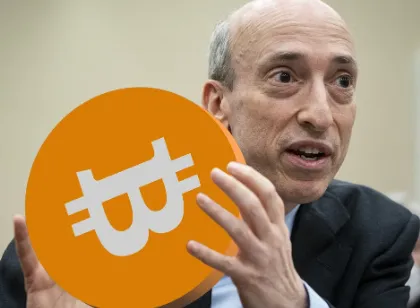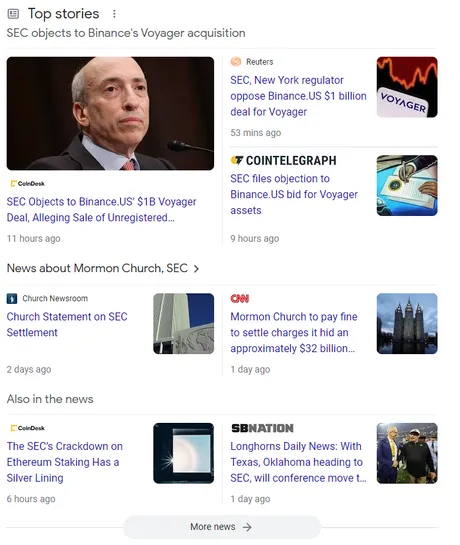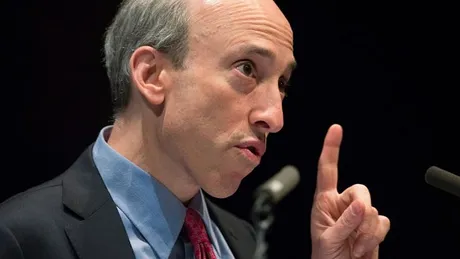
Gary Gensler very well may have been nominated as the SEC chairman simply to put a lid on crypto. I mean perhaps I have extreme bias in this arena, but I really don't hear about the SEC doing much else these days except constantly bringing the hammer down on our sector.
The left seems to be very unfriendly when it comes to crypto, granted that the right doesn't seem to be that much better. Both the left and the right are authoritarian and crypto is libertarian by design. Big Government can't do anything but hate on it. This is to be expected.
I just typed in "SEC news" into Google and it's mostly crypto stuff, with the one outlier being the Mormon Church hiding a $32B investment fund from the gubment.

Gary Gensler is a very weird character in my opinion. Personally I don't like him. He treats everyone like they are children and never turns off the "explain it like I'm five" dialog. However, the more I listen to him speak the more I come to realize that honestly a lot of the things he says are perfectly reasonable. Maybe he's such a good politician that I have yet to see through his ruse.
The rules for securities are not a new thing.
As I have done more and more research over the last year or two I've come to realize that securities law is pretty cut and dry. Yes, the Securities Exchange Commission is trying to flex on crypto. They are imposing rule by enforcement and not providing regulatory clarity. Securities law might be pretty cut and dry but crypto is anything but.
Then again...
We would never be in this situation in the first place if crypto had actually been built the way it was meant to be built: decentralized. Crypto became so centralized that now the SEC is fishtailing and spiraling out of control trying to reign it back in. Of course this sentiment also assumes that the SEC has no ulterior motive when it comes to crypto and the government, which at this point is a very liberal assumption considering that the entire point of crypto is to take power away from the government and banks.

Like any three-letter agency born of the government, the SEC wants to not retain the power they have, but also gain more power in any way they can. The Crypto Orchard is the perfect place for them to pick all the low-hanging fruit. There are no shortage of scams and unregulated tokens to go after. Potential fine revenue is limitless.
It's a regulatory gold-rush I tell ya.
The regulation-by-enforcement strategy is all part of this process as well. The SEC knows that if they provide regulatory clarity that crypto projects will jump behind that clarity as a shield and exploit it in every way possible. The financial incentives in play are simply too powerful for any other outcome to occur.
We all know that crypto develops a hundred times faster than the regulators can regulate. By the time the SEC provided any kind of regulatory clarity dev teams would be able to loophole out of the laws in dozens of different ways that the SEC had never considered. This, in addition to the concept that the SEC must consolidate power, is why I must conclude that the Gensler refuses to provide the clarity being demanded and continues to arbitrary attack whichever crypto company catches his fancy.

In any case...
The reason I wrote this post is because on February 15th I was sitting in a waiting room reading crypto news on my phone when I came across this article on regulation. I don't often use my phone to do this type of research so I tucked the tab away on Chrome so I could write this report on it later. Forgot about it till just now when I opened Chrome on my phone and saw the tab. Like I said I don't use my phone much... and actually this is my second smartphone ever in my entire life. I sure I have most ~all~ of you beat on that front.
SEC proposes rules that would change which crypto firms can custody customer assets
The proposed changes would mandate custodians, including crypto exchanges, secure or maintain certain federal or state registrations,
No surprises yet... we all know the SEC's overreach is a thing of legend and they've been talking a lot about staking-as-a-service being a big no-no.
Under the new rules, in order to custody any client asset — including and specifically crypto — an institution would have to hold the charters, or qualify as a registered broker-dealer, futures commission merchant, or be a certain kind of trust or foreign financial institution.
Again as I was reading this I was just like blah blah blah same old shit different day.
“When these platforms go bankrupt—something we’ve seen time and again recently—investors’ assets often have become property of the failed company, leaving investors in line at the bankruptcy court,” Gensler said.

The proposed changes by the SEC are also intended to “ensure client assets are properly segregated and held in accounts designed to protect the assets in the event of a qualified custodian bankruptcy or other insolvency,” according to material released by the agency on Wednesday.
Ah now I remember why I saved this tab!
This is the first example I've seen of Gensler actually doing his job and protecting investors rather than retroactively punishing projects that did everything they could to comply with vague regulations. The problem of bankruptcy is a big issue. Bankruptcy lawyers scoop customer funds into their own pockets when shit hits the fan. This is clearly unacceptable practice, and I praise Gensler for bringing it up in this context of a problem needing to be solved. Kudos to the regulators (for once).
Coinbase already has a similar arrangement in place. In its most recent earnings report, the exchange specified that it keeps customer crypto assets “bankruptcy remote” from hypothetical general creditors, but noted that the “novelty” of crypto assets meant it was uncertain how courts would treat them.
This is also an interesting tidbit because months ago the SEC legally forced Coinbase to announce that this was not the case. Coinbase had to go on record saying customer funds legally belong to Coinbase. It's nice to see that Brian Armstrong has pivoted correctly before being forced to make this change.
As for the "novelty" of crypto
Again, something I always bring up is this idea that crypto lawsuits in the future are going to be batshit insane. There is no precedent, and even if there was: devs can loophole around that precedent by tweaking the code to make the current law no longer applicable. 2023 is going to be a wild year for crypto lawsuits that's for damn sure.
Within the commissioner’s ranks, there was dissent and questions over the nature of the proposed rules. “The proposing release takes great pains to paint a “no-win” scenario for crypto assets,” SEC commissioner Mark Uyeda said. “In other words, an adviser may custody crypto assets at a bank, but banks are cautioned by their regulators not to custody crypto assets.”
We are reminded yet again that the words that spew from Gary Gensler and the SEC's mouths are often doublespeak nonsense. Their actions do not align with their stated goals. These no-win situations seem to be a running theme and are often countered with the idea of "stifling innovation", "giving the advantage to China", and "hurting investors".
It was a sentiment echoed by Coinbase’s chief legal officer, who emphasized a need for clarity, a clarion call that has been echoed throughout the industry. “We encourage the SEC to begin the rulemaking process on what should or should not be considered a crypto security, especially given that today’s proposal acknowledges that not all crypto assets are securities.
And of course we end it on the note that the SEC should provide clarity. We know why the SEC doesn't want to (consolidation of power) and would prefer the rule-by-enforcement phase to last forever. However the SEC's hand may be forced in this regard, especially if they lose a crypto lawsuit here or there. Ripple winning their lawsuit would be a massive blow to SEC authority, and by all accounts it looks like there is a surprisingly significant chance of that happening.
Conclusion
Gary Gensler did his job for once. He is obviously correct in his assessment that it is wholly inappropriate for customer assets to be used as leverage within bankruptcy proceedings. It's nice to see the regulators actually doing their job for once. This isn't something we get to see very often. Hopefully it will lead to a positive development, unlike most of the other regulatory jargon we've been putting up with lately.
Posted Using LeoFinance Beta
Return from That One Time Gary Gensler Did His Job to edicted's Web3 Blog
